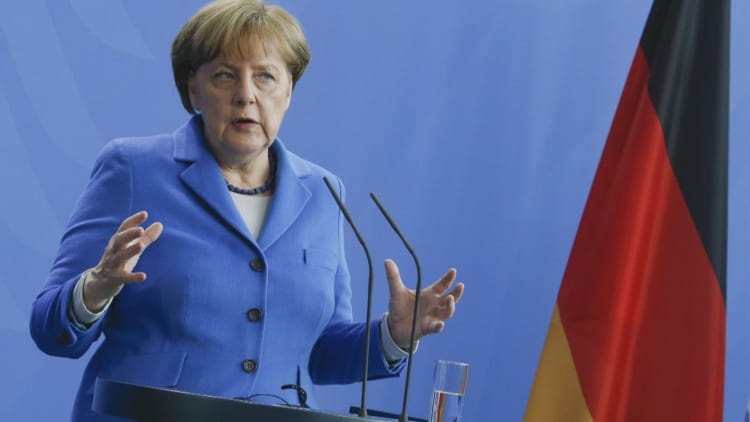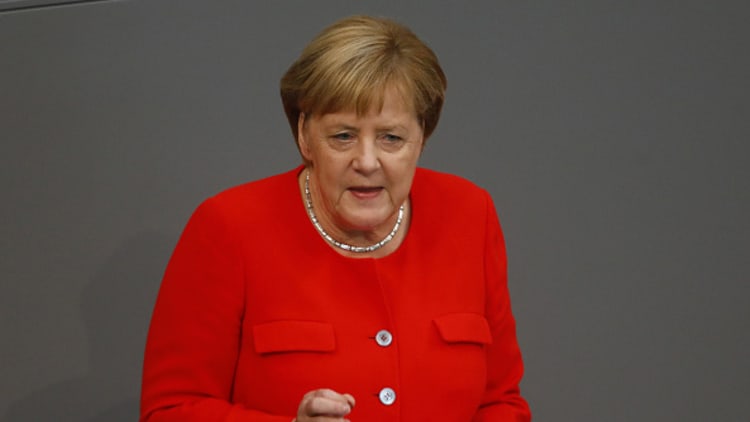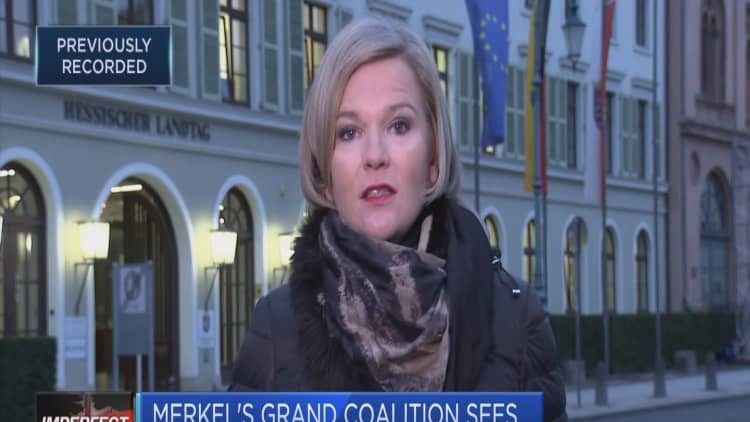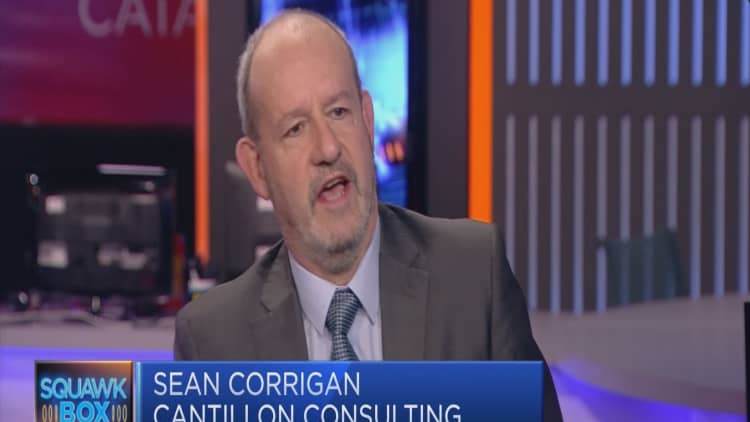
Angela Merkel said Monday she will not seek a fifth term as chancellor, effectively beginning the winding down of her time as German leader.
Merkel announced that she will not be seeking any political posts after her term as chancellor ends in 2021. She added that she will also not stand for re-election as chairwoman of her Christian Democratic Union party when it holds an election for the post in December.
"This term is my last as chancellor," she said, according to a translation. "I will not be seeking re-election as a CDU lawmaker. I will not be seeking any political posts after the current terms ends in 2021," she added, in what was the first confirmation from the German leader that she will step down after being in power since 2005.
The announcement follows a disappointing regional election in the state of Hesse on Sunday.
Merkel, 64, will continue to lead the country even without being the head of the party. Another chair at the helm of the CDU would then have time to try to build up a popular presence with voters ahead of the next federal election in 2021.
Alluding to the fractious coalition government she leads, Merkel said the party would have secured better results in Hesse had it not been for the situation at the federal level. "The government has lost credibility," Merkel said at Monday's press conference.
'Break with her previous position'
Vacating the party leadership is seen by some as a move to placate those within her party that might have sought to oust Merkel before her fourth term ends. Carsten Nickel, deputy director of research at Teneo Intelligence, said in a note Monday that Merkel had traded in the "CDU leadership to save her chancellorship."
Merkel's comments also mark a shift from her previous stance on party and government leadership. "This is a break with her previous position that a separation of the two roles would weaken her position as chancellor," Greg Fuzesi, an economist at J.P. Morgan, said in a note Monday.
"It is worth noting at this point that the chancellor is elected by the Bundestag (German Parliament) while the leader of the CDU is elected by CDU party members. Hence, they can be held by two different people."
The euro fell 0.4 percent against the dollar on reports of her decision earlier in the day, but soon recovered slightly to trade 0.18 percent lower.
Other experts are still skeptical that Merkel could see out a full fourth term. "If she manages to stay on as chancellor after the CDU elects a new leader, probably on December 7, she would still be seen as a lame duck," Holger Schmieding, chief economist at Berenberg Bank, said in a note Monday.

"By relinquishing her role at the helm of the CDU voluntarily, she may try to head off a challenge from a potential successor which, if successful, could also have toppled her as chancellor."
Annegret Kramp-Karrenbauer and Jens Spahn both announced their bids for the party leadership on Monday but Merkel declined to publicly back either of them. She said she did not wanted to influence the election of her successor as CDU party leader, Reuters reported.
Hesse election
A regional election in the German state of Hesse delivered another political blow to Merkel on Sunday, with more voters fleeing to the left and right.
Merkel's CDU party and her coalition partner in Berlin, the Social Democratic Party, saw heavy losses in the state of Hesse on Sunday. In the meantime, the left-wing Greens and right-wing, anti-immigrant Alternative for Germany saw their share of the vote increase dramatically.
Provisional results from the state's statistics office showed the CDU got 27 percent, down 11.3 percentage points since the last election in 2013 and marking the worst result for the party since 1962. The SPD saw its support fall from 30.7 percent in 2013 to 19.8 percent in the vote.
Meanwhile, the Greens gained 19.7 percent (up from 11.1 percent) and the AfD was seen with 13.2 percent of the vote, tripling its vote share from 2013 and allowing it to enter parliament for the first time.

For Hesse, the result means the incumbent CDU-Greens coalition has lost its majority and could rely on the pro-business Free Democratic Party (FDP) to form a grand coalition. This so-called Jamaica alliance, named for the colors of the parties involved, was mooted after the German federal election last October but it failed to come to fruition.
Not that the coalition that Merkel eventually formed in Berlin has done much better. The alliance of Merkel's CDU party and its Bavarian sister party, the Christian Social Union and the SPD has been plagued by infighting and argument over policy; the latest test of political sentiment is another confirmation that voters were not impressed.
'No one is happy'
Despite the CDU remaining the largest party, Klaus-Peter Willsch, the CDU's representative in Hesse, told CNBC that the result was an indictment of the federal government and that no one is satisfied with the result.
"This is a true hint that it is not a state policy but a federal policy problem we are facing — everyone could see our government is not performing," he told CNBC's Annette Weisbach on Sunday. "I hope that we have a new start. … They (the SPD) won a bit and we won a bit and no one is really happy with it."
For Berlin, the result is another blow to an already fractious and fragile alliance. A similar election result was recorded at the Bavarian state elections a few weeks ago and there is speculation that the SPD might jump ship as it sees voters punishing it for its association with the government.
"It's a very bad result and therefore need to figure out now how we regain credibility and the trust of the citizens. Above all in Berlin," the Hessian SPD's general secretary, Nancy Faeser, told CNBC on Sunday. Meanwhile, Kal Klose, chairman of the Greens party in Hesse, told CNBC that the regional election had shown that "the people don't like the style of how the grand coalition works."
There are growing calls in the SPD to abandon the coalition, with vote losses being associated with the government rather than staying in opposition as it had promised supporters. The party's leader, Andrea Nahles, is to present an "action plan" on Monday addressing concerns. There is bound to be some soul-searching for the CDU, too, at an upcoming party convention on Dec. 6.

More than a populist 'wave'
With voters becoming increasingly disenchanted with the old political guard and many turning to the right-wing AfD for answers, Berlin needs to take note of the big shift taking place in German politics, analysts said.
"The main risk to Merkel's shaky grand coalition in Berlin remains SPD infighting, but internal CDU dynamics will equally continue to create uncertainty," Teneo's Nickel said in a note late Sunday. He added that both parties were being "pulled in both directions" as they face threats from the left and right.
"Awareness for this fundamental degree of political change is, however, very limited in both formerly large parties. Instead, parts of the SPD will continue to blame the grand coalition for their party's ails; many in the CDU are suggesting that with a more conservative profile and a gradual replacement of Merkel, their party could be aiming for results closer to 40 percent again."
The rise of the overtly nationalist and anti-immigrant AfD party has been reflected throughout Germany and is a worrying trend for liberals in Germany. The party's increasing popularity has accompanied a rise in immigration to Germany and is seen as a rejection of Merkel's migrant policy.
"The underlying dynamic in German politics is twofold," Nickel continued in his note.
"First, the AfD is now represented in all 16 regional state parliaments and the Bundestag. (Sunday's) result is therefore the final piece of evidence that the AfD has established itself within the German party system. Talk of a populist 'wave' does not nearly reflect the level of realignment that is currently underway in German politics."


